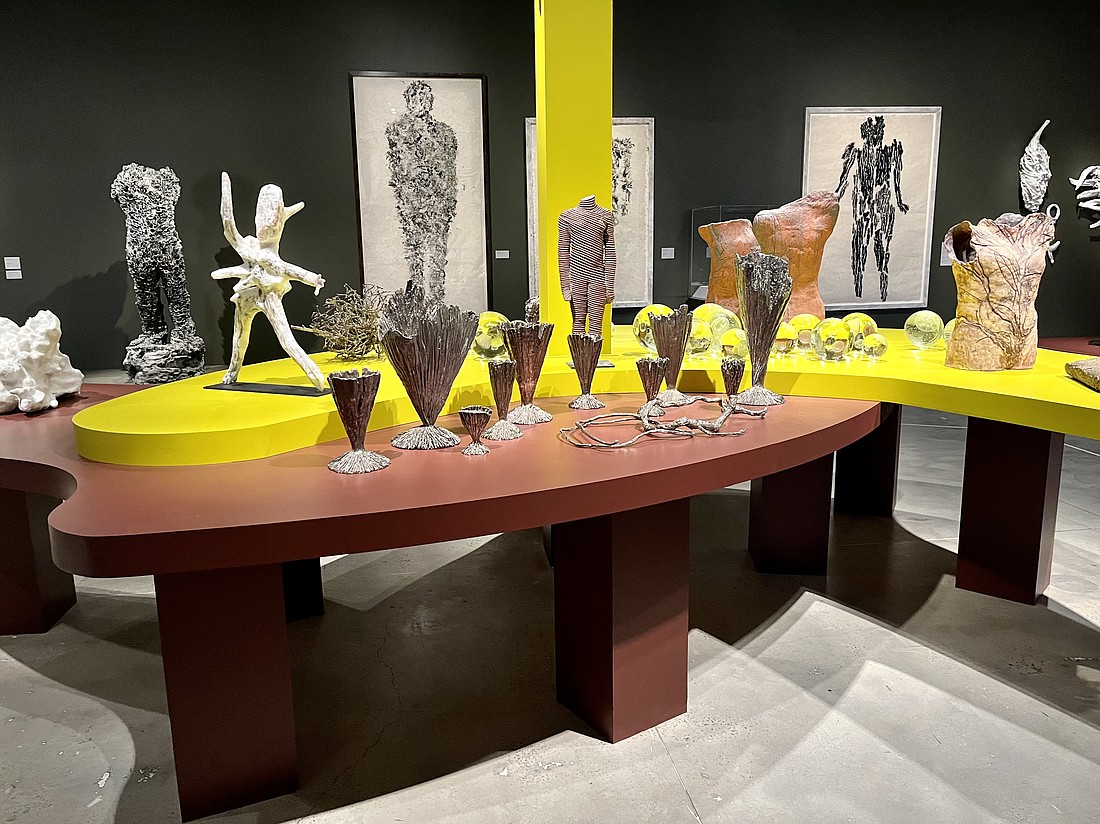- September 20, 2024
-
-
Loading

Loading

“Don’t judge a book by its cover,” goes the old saying. Well, don’t judge a museum exhibit by its name.
Before I arrived at The John & Mable Ringling Museum of Art to tour Michele Oka Doner’s show, “The True Story of Eve,” I assumed it was going to be some kind of feminist rant using objects. (Not that there’s anything wrong with that, to quote Jerry Seinfeld.)
I was wrong. While “The True Story of Eve,” the artist’s first solo exhibition at The Ringling, invokes the name of the world’s first female, it seems more like a temple of a goddess who presided over Earth before humans came and messed everything up.
When I got the chance to interview Doner by phone, I used my allotted time to talk about her life and how she created the paper, wood, ceramic, bronze and glass works from the 1960s to the present that are on display in Sarasota. We didn’t talk feminism or politics.
“The True Story of Eve,” which runs at the Monda Gallery through June 2, doesn’t have a catalog or an artist’s statement, despite the fact that Doner is remarkably articulate. But her works make a powerful statement on their own about the quickly disappearing paradise we call Florida.
Born in 1945, Doner grew up in Miami Beach and was immersed in an artistic and political environment from the moment she emerged from the womb. Her grandfather, Samuel Heller, was a painter, and her father, Kenneth Oka, was elected a judge and mayor of Miami Beach.

The family’s high profile in Miami Beach has continued with Oka Doner, who has been designated Guardian of the City of Miami Beach’s Great Banyan Tree and represents Miami Beach as Ambassador for Arts and Culture.
At the age of 12, Oka Doner began a year-long independent study of the International Geophysical Year, a global project that actually lasted 18 months, from July 1, 1957 to Dec. 31,1958. The book of drawings, writings and collages that she put together as an adolescent became a template that would inform her later projects.
In addition to documenting the environment, Oka Doner worked to preserve the social history of Miami Beach from the 1920s to the 1960s, in a book she co-authored with Mitchell Wolfson Jr. Titled “Miami Beach: Blueprint of an Eden,” the book is considered a classic of social history, according to Oka Doner’s biography on the Wiki.
Clearly, the theme of paradise lost has been guiding Oka Doner’s work for a long time.
Even if you’re not a student of art or social history, no doubt you’ve seen Oka Doner’s work if you’ve traveled through the Miami International Airport. Her 1995-99 installation, “A Walk on the Beach” and its followup, “A Walk on the Beach: Tropical Gardens” (1996–2010) is on display there. More than a mile long, the piece containing 9,000 bronzes embedded in terrazzo with mother-of-pearl is one of the largest artworks in the world.
Despite the fact that her art memorializes disappearing nature, Oka Doner is an optimist with a sardonic sense of humor. Discussing whether she will be able to find a newspaper article once it’s published, she quips, “Print is in remission.”
Oka Doner’s reverence for the natural world doesn’t preclude her from using state-of-the-art technology to create her artworks.
She’s used CAD (computer-aided design) to impose an image of an aspen from France on a large wall in Aspen, Colorado.
A wooden bench that you can sit on in The Ringling’s Monda Gallery was digitally cut, Oka Doner says. “You can’t deny the future but you can help shape the future,” she says.
Oka Doner’s show at The Ringling came about in a circuitous fashion. Her art was introduced to Sarasota by Gertrude Kasle, a Detroit gallerist who gave Oka Doner her first exhibition. Kasle, who died in 2016, was a mover and shaker in Detroit’s contemporary art scene in the 1960s and 1970s.
Kasle had a second home in Sarasota and she gifted one of Oka Doner’s pieces to The Ringling. Not long after Ola Wlusek was named curator of modern and contemporary art at the museum in 2018, she found Oka Doner’s work in a storage closet.
After Wlusek included Oka Doner’s piece in a show of art from The Ringling’s collection, the two began a conversation about the potential for a solo show by Oka Doner in Sarasota. Wlusek selected 80 pieces for the exhibition.
None of the artworks, which range from massive drawings to decorative vases, was created new for “The True Story of Eve,” Oka Doner says. They were created during the 60-year period from the 1960s to the 2020s, she says.
Don’t call the show a retrospective, though. Artists don’t like to use that word as long as they’re alive and still working.
Because of the long period of time and the breadth of media encompassed by “The True Story of Eve,” Oka Donner said she decided against writing a statement. “How do you explain 60 years?” she asks.
Pressed to describe her work, Oka Doner says, “There’s no organizing principle. I’m a hunter/gatherer. I know where to find things.” She notes that she might pick up some grapes in the street near her SoHo studio in New York City that were squashed by a truck.
So is her art made from salvaged objects? No. “Salvage implies an intention to save,” she says. “I’m not saving them from anything. I’m picking them up, examining them, liking the color and enjoying the moment.”
After you leave the Oka Doner show, take time to wander the grounds of The Ringling. Savor the moment. There is still a patch of paradise left in fast-growing Sarasota.